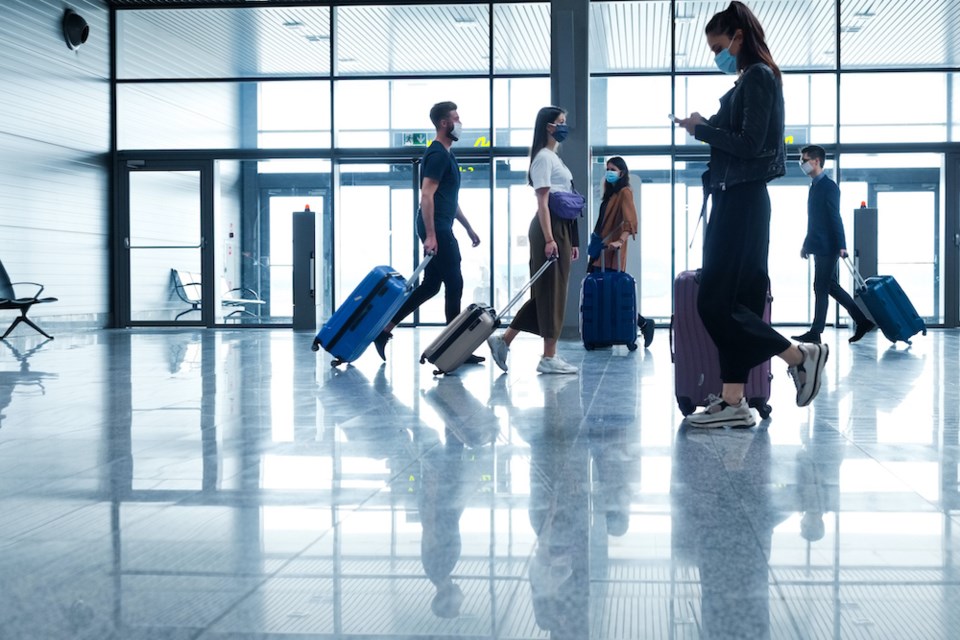Are you excited about travelling internationally this fall and winter?
While some Canadians can't wait to travel overseas or simply across the U.S. border, others feel alarmed by the idea.
On Sept. 7, B.C. will move into the final step of its four-step 'restart' plan. However, the federal government hasn't indicated when the advisory against international travel will be lifted and doing so is contingent on several factors.
That said, many Canadians have continued to travel in spite of the government advisory. And as restrictions on travel continue to ease across Canada and around the world, some experts feel a "fourth wave" of COVID-19 could occur domestically.
Cases of 'Delta' variant surge overseas and south of the border
Rapidly spreading in countries worldwide, the 'Delta' variant is under the global microscope as scientists assess the risk the highly transmissible strain poses to eliminating COVID-19.
Originally a variant of interest, B.1.617.2, now known as the Delta variant of concern under the World Health Organization's new naming system, surfaced in Canada earlier this year. In April, incoming passenger flights from India and Pakistan were banned in an effort to curb the spread of the highly transmissible strain.
Experts say the Delta variant spreads more easily because of mutations that make it better at latching onto cells in our bodies. In the United Kingdom, the variant is now responsible for 90 per cent of all new infections. In the U.S., it represents over 20 per cent of infections, and health officials say it could become the country’s dominant type as well.
South of the border, Dr. Anthony Fauci, the United States' top infectious disease expert, told reporters in a White House COVID-19 Response Briefing on June 22 that the Delta variant's "transmissibility is undeniably greater."
Similar to the United Kingdom, "the Delta variant is currently the greatest threat in the U.S. in our attempt to eliminate COVID-19," he said, adding that the "good news" is that the "vaccines are effective" against the highly transmissible variant.
'We need to be very alert.'
Dr. Horacio Bach, Adjunct Professor, Division of Infectious Diseases, Faculty of Medicine at the University of British Columbia, told Vancouver Is Awesome that he believes it will only be a matter of time before the Delta variant is the predominant one locally.
"We need to be very alert. In my opinion, it will be a question of time before it takes over the previous one, [Alpha]," he explained.
"We don't know if Delta will be the dominant or not but we know that younger people are infected with it and the symptoms are a little different from the original Wuhan strain."
In regard to travel, Bach said he feels that it is too early to open Canada's borders to international travel.
"I always say that we are opening too fast," he said. "I understand people are eager to go but the problem is that we have to understand that there are parts of the world that they haven't even [received] vaccines yet; they have a high level of people who are sick.
"You are inviting or potentially bringing new variants."
Delta variant around the world
Israel, a world leader in coronavirus vaccinations, reported its highest daily infection rate in three months as it scrambles to contain the spread of the new delta variant. In recent months, the country reopened its businesses, schools and event venues, lifting nearly all restrictions after it inoculated some 85 per cent of the adult population. It's now seen as an early-warning system of sorts for other nations.
Bach noted the Delta variant was imported into Israel. "They didn't have that," he said. "And now indoors they have to use the mask."
While countries with high levels of vaccination may still see a surge in COVID-19 cases via highly transmissible variants, Bach added that there are also numerous countries that don't have access to vaccines. In some cases, countries that see extreme poverty do not have the capability to test people for the virus. As a result, case numbers are unknown as well as the prevalence of variant strains.
COVID-19 Vaccines Global Access, abbreviated as COVAX, is a worldwide initiative aimed at equitable access to COVID-19 vaccines directed by Gavi, the Vaccine Alliance, the Coalition for Epidemic Preparedness Innovations, and the World Health Organization.
The global initiative recognizes that in a "fast-moving pandemic, no one is safe, unless everyone is safe."
With files from the Canadian Press and the Associated Press.


